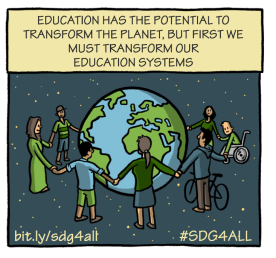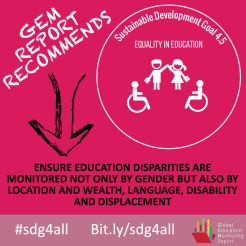Later today in New York the GEM Report is holding a high-level round table discussion with key partners and stakeholders on the fringes of the General Assembly.
Moderated by Professor Jeffrey Sachs, Chair of the GEM Report Advisory Board, the event will bring together member states and many of the most influential voices from the sustainable development and education communities, including: Irina Bokova, Director General of UNESCO; Gordon Brown, UN Special Envoy for Global Education; Babatunde Osotimehin, Executive Director of UNFPA; Angel Gurría, Secretary-General of the OECD; and David Nabarro, Special Adviser on 2030 Agenda for Sustainable Development.
This blog contains some of the key points I will be making in my presentation.
WATCH LIVE TODAY 1.15-2.30pm EST : webtv.un.org
@GEMReport #sdg4all
The discussion will focus on the key recommendations from the GEM Report Education for people and planet: Creating sustainable futures for all, which found that at current rates of progress we won’t achieve key global education commitments until 2084. There is no alternative but to seriously step up efforts in education, which is why this event will be focused on practical suggestions that can help to quicken the progress we’re making around the world.
The GEM Report shows the value of a collaborative approach, with investments in integrated interventions having a multiplier effect for key development outcomes – across health, women’s empowerment, peace and climate change mitigation.
 It also shows that progress towards more sustainable futures involves a transformation in the design of education. Education systems must do more than just transfer knowledge. We need the right type of education in order to tackle the challenges we face: education that fosters inclusive values, builds sustainable skills, and achieves our shared vision of a more equitable, just and peaceful world.
It also shows that progress towards more sustainable futures involves a transformation in the design of education. Education systems must do more than just transfer knowledge. We need the right type of education in order to tackle the challenges we face: education that fosters inclusive values, builds sustainable skills, and achieves our shared vision of a more equitable, just and peaceful world.
While formal education is vital, learning must also continue outside of the classroom. In the next 15 years, most of the critical decisions for this planet will be made by people who have already left school. Their adult education opportunities are vital; we need a renewed focus on lifelong learning, including giving adults opportunities to expand their knowledge and improve their skills.
One vital focus for us all must be to improve equity, which, among many benefits, especially in terms of girls’ education, would curtail population growth, transform social norms and practices across generations, and limit the burden on the planet.
As is evident, there are large expectations hanging on effective progress in education. Monitoring this progress is therefore crucial.
 Firstly, ministries of education are not always aware of the extent of education inequality. They should be more involved in the design of surveys collected by national statistical agencies and the use of their results. An international household survey programme dedicated to education could also help in that direction.
Firstly, ministries of education are not always aware of the extent of education inequality. They should be more involved in the design of surveys collected by national statistical agencies and the use of their results. An international household survey programme dedicated to education could also help in that direction.
Secondly, to assess what skills people have to contribute towards sustainable development, countries need to monitor a range of learning outcomes over time via assessments, including among those who have left school early. A code of conduct among donors will be needed to maximize synergies and avoid overlaps.
But assessing the quality of education cannot be reduced to just monitoring learning outcomes. It should include a look at policies, curricula, textbooks and teacher education programmes, reviewing how they address tolerance, human rights, and sustainability, for instance.
Education systems need increased, predictable and equitable financing. We strongly recommend countries adopt a national education accounts approach to monitor spending not only from governments and donors but also from households so that we know if costs are being shared fairly.
Governments would also benefit from exchanging information between them, as happens in Europe and Latin America, in order to understand how others in a similar situation have responded to address education challenges. The role of regional organizations here is critical.
Education can transform the way we work, the way we use resources, the way we build cities, and the way we provide services equitably. But this transformation is not something that the education community can do alone. We hope this year’s GEM Report will be used widely. If you have ideas on how we can share the key messages from the Report with other sectors and networks, do let us know.





It is heartening to note the great interest shown by the UN systems regarding education from different angles.This is especially so in relation to the importance of research and analysis of data in contexts providing true picture of the scenarios for action and policy changes. Rightly the emphasis is on learning from realities and past errors. The emphasis on SDG is very appropriate and I feel that SDG should be part of all learning programs at all levels. to show the world the growing dangers by the day.
Dr. S.B.Ekanayake
former Basic Education Adviser UNESCO/UNHCR Afghanistan
currentty CEO Association for Educational research and Development Sri Lanka
LikeLike